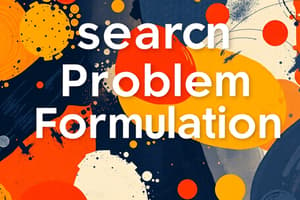Podcast
Questions and Answers
What is the first step in formulating a research problem according to Kumar (2018)?
What is the first step in formulating a research problem according to Kumar (2018)?
- Dissect the broad areas into subareas (correct)
- Raise research questions
- Identify a narrow field or subject area of interest
- Assess the feasibility of achieving objectives
What should be done if there are too many research questions to be manageable?
What should be done if there are too many research questions to be manageable?
- Go through the process of elimination (correct)
- Formulate objectives based on all the questions
- Proceed to the next stage without eliminating any questions
- Consult others who have knowledge of the area
Why is it important to assess the objectives formulated for a research problem?
Why is it important to assess the objectives formulated for a research problem?
- To consult others who have knowledge of the area
- To ascertain the feasibility of achieving them (correct)
- To raise more research questions
- To make a list of research questions
Which type of variable is manipulated during an experiment?
Which type of variable is manipulated during an experiment?
What would be the dependent variable in an experiment studying the effects of temperature on ice melting?
What would be the dependent variable in an experiment studying the effects of temperature on ice melting?
In an experiment on the effects of light intensity on plant growth, what would be a control variable?
In an experiment on the effects of light intensity on plant growth, what would be a control variable?
The variable that is affected by the amount of fertilizer applied in an experiment on plant growth is called the:
The variable that is affected by the amount of fertilizer applied in an experiment on plant growth is called the:
What kind of variable allows a scientist to know that the experiment is only testing what they want to test?
What kind of variable allows a scientist to know that the experiment is only testing what they want to test?
If you think of the independent variable as the cause, then the dependent variable can be thought of as the:
If you think of the independent variable as the cause, then the dependent variable can be thought of as the:
What is the role of a hypothesis in research?
What is the role of a hypothesis in research?
What should a good hypothesis be according to the text?
What should a good hypothesis be according to the text?
What is the purpose of testing the hypothesis?
What is the purpose of testing the hypothesis?
What is the null hypothesis about?
What is the null hypothesis about?
What does the alternative hypothesis state?
What does the alternative hypothesis state?
What does the literature and existing research help with when formulating a hypothesis?
What does the literature and existing research help with when formulating a hypothesis?
What does a good hypothesis propose?
What does a good hypothesis propose?
"After you have identified your research problem, what should you proceed to formulate?"
"After you have identified your research problem, what should you proceed to formulate?"
Flashcards are hidden until you start studying
Study Notes
Definition of a Research Problem
- A research problem is a clear and definite statement regarding a specific area of concern.
- It highlights a difficulty that needs elimination, conditions requiring improvement, or issues existing in theory, literature, or practice.
- Indicates the necessity for meaningful investigation and inquiry.
Purpose of a Problem Statement
- Introduces the importance of the research topic to the reader, establishing relevance.
- Contextualizes the problem, defining parameters for the investigation.
- Provides a framework for reporting results and outlines necessary components for the study.
Characteristics of an Effective Research Problem
- Reflects significant issues or needs that warrant investigation.
- Based on factual evidence rather than hypothetical scenarios, ensuring credibility.
- Manages scope and relevance, making the inquiry feasible.
- Suggests a testable and meaningful hypothesis while avoiding trivial or useless answers.
Studying That Suits You
Use AI to generate personalized quizzes and flashcards to suit your learning preferences.




